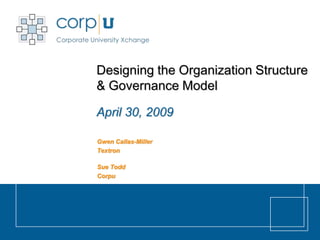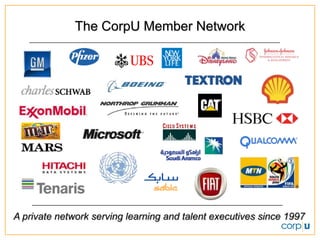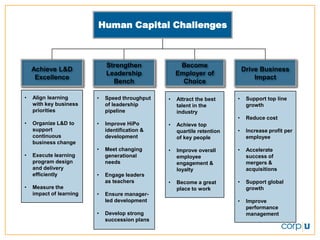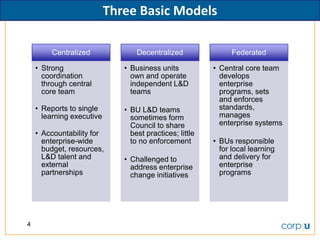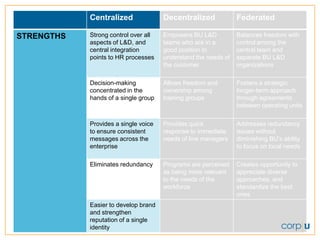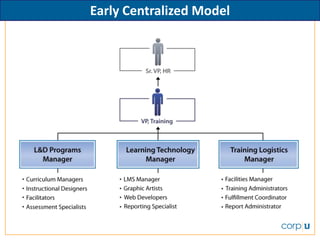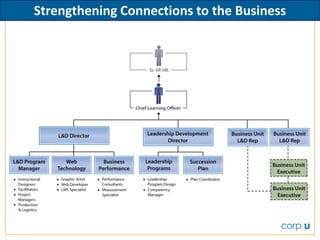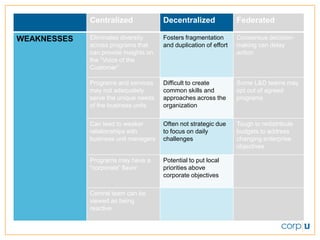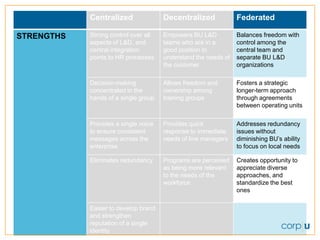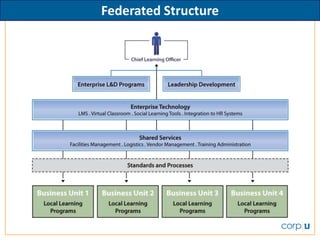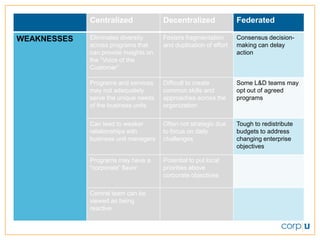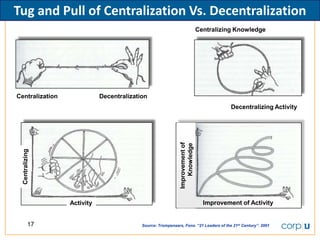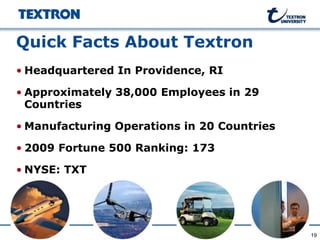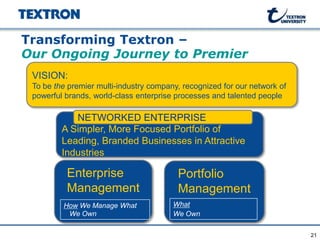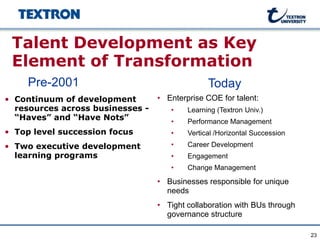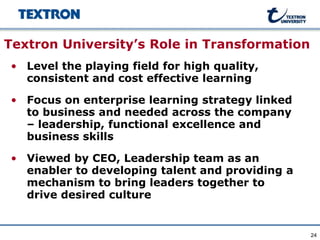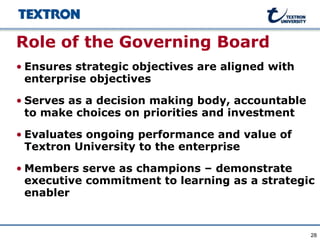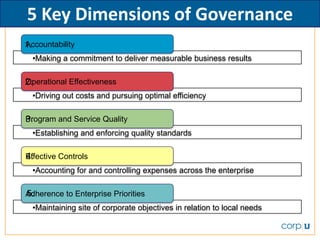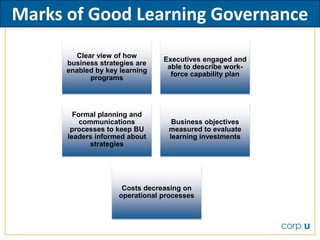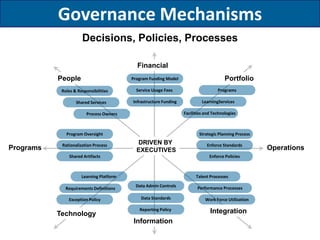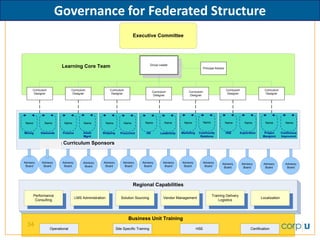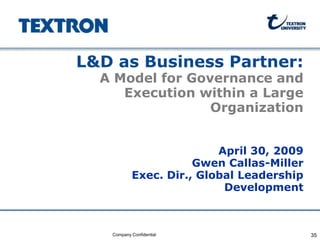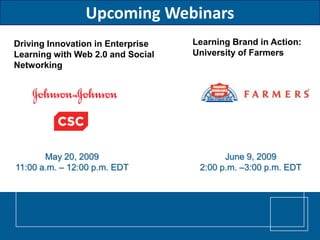Learning Organization Governance for Top Performers
- 1. Designing the Organization Structure & Governance Model April 30, 2009 Gwen Callas-Miller Textron Sue Todd Corpu
- 2. The CorpU Member Network A private network serving learning and talent executives since 1997
- 3. Human Capital Challenges Strengthen Become Achieve L&D Drive Business Leadership Employer of Excellence Impact Bench Choice • • Align learning • Speed throughput • Support top line Attract the best with key business of leadership growth talent in the priorities pipeline industry • Reduce cost • • Organize L&D to Improve HiPo • Achieve top support • identification & Increase profit per quartile retention continuous development employee of key people business change • • Meet changing • Accelerate Improve overall • Execute learning generational success of employee program design needs mergers & engagement & and delivery acquisitions loyalty • efficiently Engage leaders • as teachers • Support global Become a great • Measure the growth place to work • impact of learning Ensure manager- • led development Improve performance • Develop strong management succession plans
- 4. Three Basic Models Centralized Decentralized Federated • Strong • Business units • Central core team coordination own and operate develops through central independent L&D enterprise core team teams programs, sets and enforces • Reports to single standards, • BU L&D teams manages learning executive sometimes form enterprise systems Council to share • Accountability for best practices; little • BUs responsible enterprise-wide to no enforcement budget, resources, for local learning L&D talent and and delivery for • Challenged to external enterprise address enterprise partnerships programs change initiatives 4
- 6. Characteristics of L&D Organizing Decisions
- 7. Centralized Decentralized Federated Strong control over all Empowers BU L&D Balances freedom with STRENGTHS aspects of L&D, and teams who are in a control among the central integration good position to central team and points to HR processes understand the needs of separate BU L&D the customer organizations Decision-making Allows freedom and Fosters a strategic concentrated in the ownership among longer-term approach hands of a single group training groups through agreements between operating units Provides a single voice Provides quick Addresses redundancy to ensure consistent response to immediate issues without diminishing BU’s ability messages across the needs of line managers enterprise to focus on local needs Eliminates redundancy Programs are perceived Creates opportunity to as being more relevant appreciate diverse to the needs of the approaches, and workforce standardize the best ones Easier to develop brand and strengthen reputation of a single identity
- 9. Strengthening Connections to the Business
- 10. Centralized Decentralized Federated Eliminates diversity Fosters fragmentation Consensus decision- WEAKNESSES across programs that and duplication of effort making can delay can provide insights on action the “Voice of the Customer” Programs and services Difficult to create Some L&D teams may may not adequately common skills and opt out of agreed serve the unique needs approaches across the programs of the business units organization Can lead to weaker Often not strategic due Tough to redistribute relationships with to focus on daily budgets to address business unit managers challenges changing enterprise objectives Programs may have a Potential to put local “corporate” flavor priorities above corporate objectives Central team can be viewed as being reactive
- 11. Centralized Decentralized Federated Strong control over all Empowers BU L&D Balances freedom with STRENGTHS aspects of L&D, and teams who are in a control among the central integration good position to central team and points to HR processes understand the needs of separate BU L&D the customer organizations Decision-making Allows freedom and Fosters a strategic concentrated in the ownership among longer-term approach hands of a single group training groups through agreements between operating units Provides a single voice Provides quick Addresses redundancy to ensure consistent response to immediate issues without diminishing BU’s ability messages across the needs of line managers enterprise to focus on local needs Eliminates redundancy Programs are perceived Creates opportunity to as being more relevant appreciate diverse to the needs of the approaches, and workforce standardize the best ones Easier to develop brand and strengthen reputation of a single identity
- 13. Centralized Decentralized Federated Eliminates diversity Fosters fragmentation Consensus decision- WEAKNESSES across programs that and duplication of effort making can delay can provide insights on action the “Voice of the Customer” Programs and services Difficult to create Some L&D teams may may not adequately common skills and opt out of agreed serve the unique needs approaches across the programs of the business units organization Can lead to weaker Often not strategic due Tough to redistribute relationships with to focus on daily budgets to address business unit managers challenges changing enterprise objectives Programs may have a Potential to put local “corporate” flavor priorities above corporate objectives Central team can be viewed as being reactive
- 14. Centralized Decentralized Federated Strong control over all Empowers BU L&D Balances freedom with STRENGTHS aspects of L&D, and teams who are in a control among the central integration good position to central team and points to HR processes understand the needs of separate BU L&D the customer organizations Decision-making Allows freedom and Fosters a strategic concentrated in the ownership among longer-term approach hands of a single group training groups through agreements between operating units Provides a single voice Provides quick Addresses redundancy to ensure consistent response to immediate issues without diminishing BU’s ability messages across the needs of line managers enterprise to focus on local needs Eliminates redundancy Programs are perceived Creates opportunity to as being more relevant appreciate diverse to the needs of the approaches, and workforce standardize the best ones Easier to develop brand and strengthen reputation of a single identity
- 16. Centralized Decentralized Federated Eliminates diversity Fosters fragmentation Consensus decision- WEAKNESSES across programs that and duplication of effort making can delay can provide insights on action the “Voice of the Customer” Programs and services Difficult to create Some L&D teams may may not adequately common skills and opt out of agreed serve the unique needs approaches across the programs of the business units organization Can lead to weaker Often not strategic due Tough to redistribute relationships with to focus on daily budgets to address business unit managers challenges changing enterprise objectives Programs may have a Potential to put local “corporate” flavor priorities above corporate objectives Central team can be viewed as being reactive
- 17. Tug and Pull of Centralization Vs. Decentralization Centralizing Knowledge Centralization Decentralization Decentralizing Activity Improvement of Knowledge Centralizing Improvement of Activity Activity 17 Source: Trompenaars, Fons. “21 Leaders of the 21st Century”. 2001
- 18. L&D as Business Partner: A Model for Governance and Execution within a Large Organization April 30, 2009 Gwen Callas-Miller Exec. Dir., Global Leadership Development Company Confidential Company Confidential 18
- 19. Quick Facts About Textron • Headquartered In Providence, RI • Approximately 38,000 Employees in 29 Countries • Manufacturing Operations in 20 Countries • 2009 Fortune 500 Ranking: 173 • NYSE: TXT 19
- 20. Leading Branded Businesses Textron Cessna Industrial Bell Finance Systems 20% 40% 5% 20% 15% Bell Helicopter Textron Systems Cessna Aircraft Textron Financial E-Z-GO Greenlee Jacobsen Kautex 2008 Textron Inc. Revenue: $14.25 Billion 20 Note: Percentages reflect portion of 2008 Revenues
- 21. Transforming Textron – Our Ongoing Journey to Premier VISION: To be the premier multi-industry company, recognized for our network of powerful brands, world-class enterprise processes and talented people NETWORKED ENTERPRISE A Simpler, More Focused Portfolio of Leading, Branded Businesses in Attractive Industries Enterprise Portfolio Management Management What How We Manage What We Own We Own 21
- 22. Results of Transformation Pre-2001 Today • Decentralized, • Networked organization holding company • Common processes • Businesses insulated • Horizontal councils for • Redundant activities, functions spend • Enterprise-wide values, • Limited sharing of development talent • Federated learning model • Decentralized learning model 22
- 23. Talent Development as Key Element of Transformation Pre-2001 Today • Enterprise COE for talent: • Continuum of development resources across businesses - • Learning (Textron Univ.) “Haves” and “Have Nots” • Performance Management • Top level succession focus • Vertical /Horizontal Succession • • Two executive development Career Development learning programs • Engagement • Change Management • Businesses responsible for unique needs • Tight collaboration with BUs through governance structure 23
- 24. Textron University’s Role in Transformation • Level the playing field for high quality, consistent and cost effective learning • Focus on enterprise learning strategy linked to business and needed across the company – leadership, functional excellence and business skills • Viewed by CEO, Leadership team as an enabler to developing talent and providing a mechanism to bring leaders together to drive desired culture 24
- 25. Governance Structure & Flows Transformation Leadership Team External Textron Councils Benchmark Textron University Functional Sources Advisory Group Requirements HR Leadership Council Performance Textron University Solutions Managers Lead Executive Leadership & Functional Requirements Talent Development Advisory Group BU L&D Textron Univ Support Team Design & Execution Textron University Team 25
- 26. Role of L&D Advisory Group • Serves as “voice of the customer” on annual strategic learning plan • Functions as extended TU team by participating in program design, supplier assessment, executing communications and getting local consensus on priorities • Collaborative partnership – for the most part • Members value: – Opportunity to shape learning beyond their BU boundaries, and – Share best practices across businesses 26
- 27. Textron University Advisory Group Textron’s Transformation Leadership Team (Management Committee & all Business Unit CEOs) TUAG Chair Chief HR Officer, & Management Comm. EVP Government, EVP Operations VP HR Industrial Segment International & Bell Helicopter Cessna President Management Comm. EVP, Chief Counsel Dep. Managing Dir. Asst. Controller EVP Strategy, Textron Financial Global Tech Center Textron Textron Company India Exec. Dir. Global Leadership Development, Textron * Senior Team of Top BU and Function Executives 27
- 28. Role of the Governing Board • Ensures strategic objectives are aligned with enterprise objectives • Serves as a decision making body, accountable to make choices on priorities and investment • Evaluates ongoing performance and value of Textron University to the enterprise • Members serve as champions – demonstrate executive commitment to learning as a strategic enabler 28
- 29. 5 Key Dimensions of Governance 1. Accountability •Making a commitment to deliver measurable business results 2. Operational Effectiveness •Driving out costs and pursuing optimal efficiency 3. Program and Service Quality •Establishing and enforcing quality standards 4. Effective Controls •Accounting for and controlling expenses across the enterprise 5. Adherence to Enterprise Priorities •Maintaining site of corporate objectives in relation to local needs
- 30. Marks of Good Learning Governance Clear view of how Executives engaged and business strategies are able to describe work- enabled by key learning force capability plan programs Formal planning and communications Business objectives processes to keep BU measured to evaluate leaders informed about learning investments strategies Costs decreasing on operational processes
- 31. Governance Mechanisms Decisions, Policies, Processes Financial People Portfolio Program Funding Model Service Usage Fees Programs Roles & Responsibilities Infrastructure Funding LearningServices Shared Services Facilities and Technologies Process Owners Program Oversight Strategic Planning Process DRIVEN BY Rationalization Process Enforce Standards Programs Operations EXECUTIVES Shared Artifacts Enforce Policies Learning Platform Talent Processes Data Admin Controls Performance Processes Requirements Definitions Data Standards Exception Policy Work Force Utilization Reporting Policy Integration Technology Information
- 32. Centralized Model With Governance
- 33. Governance for Decentralized Model Managing Partner (Elected to 2-year term) 33
- 34. Governance for Federated Structure Executive Committee Group Leader Learning Core Team Principal Advisor Curriculum Curriculum Curriculum Curriculum Curriculum Curriculum Curriculum Designer Designer Designer Designer Designer Designer Designer Name Name Name Name Name Name Name Name Name Name Name Name Name Name Asset Marketing Community HSE Exploration Project Continuous Mining Diamonds Finance Shipping Procurmnt HR Leadership Mgmt Relations Mangmnt Improvmnt Training Curriculum Sponsors Advisory Advisory Advisory Advisory Advisory Advisory Advisory Advisory Advisory Advisory Advisory Advisory Advisory Advisory Board Board Board Board Board Board Board Board Board Board Board Board Board Board Regional Capabilities Performance Training Delivery LMS Administration Solution Sourcing Vendor Management Localization Consulting Logistics Business Unit Training 34 Operational Site Specific Training HSE Certification
- 35. L&D as Business Partner: A Model for Governance and Execution within a Large Organization April 30, 2009 Gwen Callas-Miller Exec. Dir., Global Leadership Development Company Confidential Company Confidential 35
- 36. Q&A 36
- 37. Upcoming Webinars Learning Brand in Action: Driving Innovation in Enterprise University of Farmers Learning with Web 2.0 and Social Networking May 20, 2009 June 9, 2009 11:00 a.m. – 12:00 p.m. EDT 2:00 p.m. –3:00 p.m. EDT

